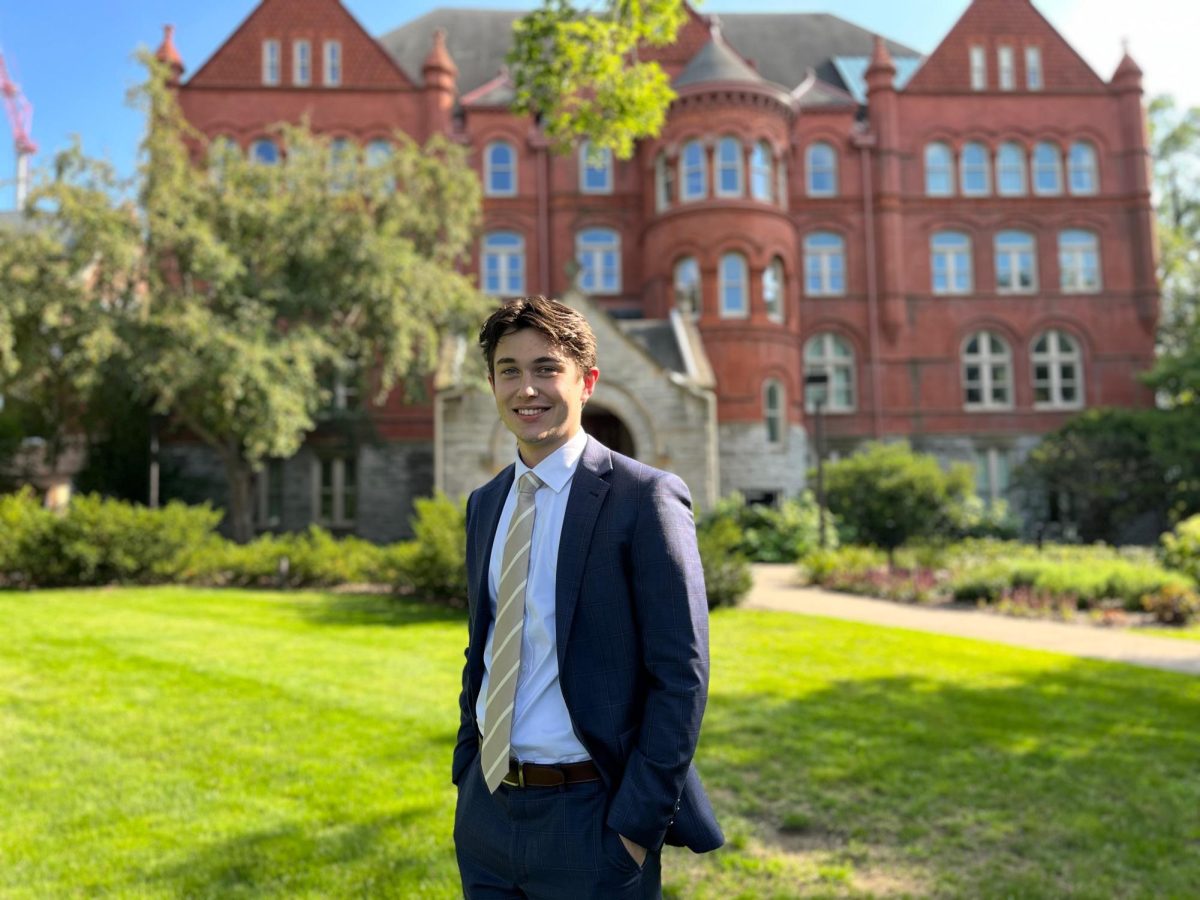On Thursday, April 18, the Macalester College Student Government (MCSG) held its weekly meeting in the DeWitt Wallace Library’s Harmon Room. At this meeting, the Legislative Body (LB) heard committee updates, an in-depth presentation on changes to the college’s finances and student organization funding appeals.
To begin the meeting, Academic Affairs Committee (AAC) Chair and MCSG president-elect Joel Sadofsky ’25 and committee-appointed student member Riley Hodin ’25 presented updates on the Educational Policy and Governance Committee (EPAG). They discussed the role EPAG plays in advising academic affairs of the college, including professorship allocations; major, minor and concentration reviews and interpreting the faculty constitution.
To end their presentation, they explained the past academic year’s efforts with discussions surrounding course cross-listings, experimental field trip time slots and the Curricular Implementation Committee (CIC), which will be accepting applications soon.
Vice President of Administration and Finance Patricia Langer then joined the meeting to give a comprehensive explanation of finances at Macalester, including the $3,974 increase in the cost of attendance for the 2024-25 academic year.
Langer explained Macalester’s 2024 revenue sources and expenditures. Net tuition is the largest revenue stream, comprising 45% of the total. As a whole, the annual revenue that comes from current students, along with room and board fees, accounts for 60% of yearly revenue. The next 31% is sourced from the endowment distribution while the remaining 9% comes largely from gifts and grants. She also noted that much of Macalester’s money is in endowed legacy investments.
As for expenditures, Langer explained that 65% of revenue is spent on faculty, staff and student wages and benefits. The next 26% goes towards student programs — academic and extracurricular. The following 5% finances capital improvements, including the upcoming Campus Center renovation, and the remaining 4% goes toward debt servicing.
The growth of Macalester’s per-student net tuition revenue, which is the total tuition and fees minus institutional grant aid, is slowing. Even though net tuition revenue is anticipated to increase each year, for the upcoming academic year, the increase in net tuition revenue will be lower than in previous years because the increase in institutional grant aid outpaces that of tuition.
After discussing the endowment, Langer explained the various causes of slowing revenue growth. She said that some of these broader trends include fewer college-age students, fewer students graduating from high school and increasing skepticism of four-year degrees.
According to Langer, it is also becoming increasingly expensive for colleges like Macalester to employ faculty and staff due to the rising cost of living, particularly healthcare costs.
“We’re thinking about how we can raise compensation for employees — they’re dealing with these inflation issues,” Langer said. “The other thing we know is: so are your families. Your families are dealing with inflation in everything they are facing, and they’re trying to afford Macalester College. …We recognize that as a part of our overall concept when we’re looking at fees and what we can do for our employees. Healthcare is killing everyone. … [These] costs are really just rocking our world.”
Langer clarified that if the college were to spend less than expected, that money would go into the unrestricted reserve, which is used for capital improvements, one-time expenditures and strategic initiatives if approved through a Board of Trustees vote.
She also addressed the common misconception that Macalester’s endowment is completely unrestricted. Langer clarified that only 9% of the endowment is unrestricted, the remaining 91% must be spent as the donor intended. About 78% of this amount contributes to financial aid.
The meeting then transitioned to questions from the LB. As Langer’s presentation took longer than expected, Kopplin proposed a meeting extension of 10 minutes, which passed with 18 votes in favor and five opposed.
MCSG members then inquired about the role federal funding plays in Macalester’s finances and what the tuition increase revenue will be used for. In response, Langer noted that federal funding only makes up 2% of the revenue, most of which goes toward employing student workers. As for the disbursement of the coming tuition increase, she explained that most of this money would be put toward increasing staff wages on campus.
LB members questioned how the $3,974 increase might affect financial aid eligibility and whether the college has started admitting more full-pay students to buoy the revenue. Regarding financial aid eligibility, Langer stated that it is variable and could not elucidate how the increase would affect the student body. While she did disclose that the college relies somewhat on full-pay students to create economic diversity, Langer does not foresee a larger increase in full-pay students to increase revenue.
When asked about Macalester’s divestment intentions regarding the genocide in Palestine, Langer seemed open to change as a sitting member of the Investment Committee.
“[We] looked at the new proposal and asked really hard questions about how we feel about what this entity is doing — is that really what Macalester should be investing into?” Langer said.
The meeting then moved from Langer’s presentation to a second appeal from Friends of Médecins Sans Frontières (MSF) after their previous request was denied. Financial Affairs Committee (FAC) Chair Eliora Hansonbrook ’25 introduced Chloe Vasquez ’24, a representative of MSF, who explained the group had a 5k fundraiser, “Macalester Run Around the World,” planned for the coming weekend, but t-shirts for the runners were ordered before the organization realized that their budget could not afford it.
She stated that all the money made from the sale of the t-shirts would be donated to their parent organization, MSF, also known as Doctors Without Borders.
Kopplin introduced the motion to approve MSF’s second appeal for $700, which passed with 16 members in favor, four in opposition and one member abstaining.
The meeting ended with Sadofsky announcing an amendment in language to the Scholarly Publishing Academic Resources Coalition statement, which MCSG voted to approve. LB members heard committee and Cabinet updates to close out their meeting.






